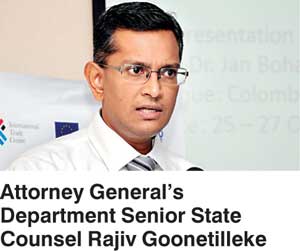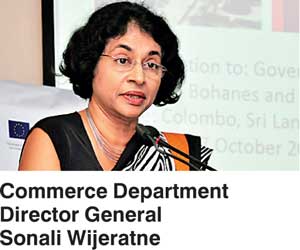Sunday Feb 22, 2026
Sunday Feb 22, 2026
Monday, 30 October 2017 00:00 - - {{hitsCtrl.values.hits}}
By Madushka Balasuriya
As the long-promised trade remedies bills finally make their way to Parliament for approval, experts have warned that their eventual effectiveness will strongly hinge on increased private sector involvement.
The two bills in question relate to the establishment of anti-dumping and countervailing measures as well as safeguards that will allow domestic legal mechanisms to investigate and offset unfair trading practices.

The move was widely welcomed by local industry stakeholders, but several misconceptions about their scope of influence and implementation have left those familiar with the legislation worried about the bills’ overall efficacy.
“There are a number of misconceptions relating to these measures. It is vital that the applicant for these measures - that is the private sector - understands exactly to what limits you can use these instruments and how effectively you can use them,” said Director General of Commerce at Sri Lanka’s Department of Commerce Sonali Wijeratne.
“Sometimes we get these very disturbing letters from companies who think that dumping is aligned with cheap imports. This is not the case. There is a misconception that trade remedies are a substitute for import duties, when in fact import duties are for revenue purposes.
“The more there is a misconception, the less efficiently we use these instruments.”
Wijeratne was speaking on Wednesday on the opening day of the three-day EU-funded workshop organised by the International Trade Centre in partnership with the Advisory Centre on WTO Law (ACWL), aimed at offering public and private sector stakeholders a clearer understanding of the new remedial trade measures and laws, both domestically and internationally.
The need for the private sector to brush up on the technicalities of these new measures was also emphasised by the Attorney General’s Department, which was involved in the drafting of the bills, and has also been working closely on a case brought against Sri Lanka in the US.

American tyre manufacturer Titan International recently filed legal action against China, India and Sri Lanka, alleging that imports from those markets were being dumped in the US market, and that the imports from all three countries benefitted from government subsidies. Senior State Counsel Rajiv Goonetilleke, who is working on the case, was keen to note that it was the private sector which had flagged the alleged improprieties.
“It was not the US government that took action, it was the industry, it was a tyre manufacturer in the US that complained to the department of commerce that there was in fact dumping. The industry has to take this on board; they have to keep their eyes open. They are the ones who are going to be impacted by imported products.
“Some of it is technical, such as the calculation of anti-dumping duties and so forth. For that you need experts. That is why there is perhaps a crying need in this country for some law firms to deal with trade law.”
For Sri Lanka this regulation is arguably more important now than it has ever been, with a slew of free trade agreements set to be agreed in the coming years. However, these regulatory measures cannot be implemented without following WTO prescribed protocols.

For example, the WTO only permits countervailing duties to be charged after the importing nation has conducted an in-depth investigation into the subsidised exports. And even then, it is likely that it will be challenged in court. According to Senior Counsel at ACWL, Dr. Jan Bohanes, 40% of all WTO disputes from 1995 to date concern trade remedies.
“Our work revolves, to a very significant amount, around trade remedies, whether it is trade investigations or at the stage of litigation. My last two cases have revolved around trade remedies. Many trade remedy measures are challenged in the WTO, so it is important to get them right,” explained Dr. Bohanes.
“These measures must comply with both domestic law and WTO law because it will very often be challenged in the WTO system. And the overwhelming majority of cases are initiated by the private sector, which petitions the Government to initiate these investigations and provides crucial evidence for the Government.”